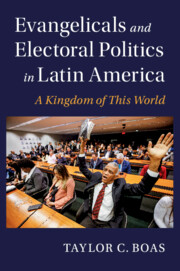Book contents
- Frontmatter
- Dedication
- Contents
- Figures
- Tables
- Preface
- Acknowledgments
- 1 Explaining Evangelical Representation
- 2 Voting Behavior and Political Institutions
- 3 Growth, Diversity, and Political Theology
- 4 Threats and Political Engagement in Brazil
- 5 Comfort and Political Quiescence in Chile
- 6 Cleavages and Political Ambivalence in Peru
- 7 Conclusions and Comparative Perspectives
- Appendix A Data Sources
- References
- Index
- References
References
Published online by Cambridge University Press: 27 January 2023
- Frontmatter
- Dedication
- Contents
- Figures
- Tables
- Preface
- Acknowledgments
- 1 Explaining Evangelical Representation
- 2 Voting Behavior and Political Institutions
- 3 Growth, Diversity, and Political Theology
- 4 Threats and Political Engagement in Brazil
- 5 Comfort and Political Quiescence in Chile
- 6 Cleavages and Political Ambivalence in Peru
- 7 Conclusions and Comparative Perspectives
- Appendix A Data Sources
- References
- Index
- References
Summary

- Type
- Chapter
- Information
- Evangelicals and Electoral Politics in Latin AmericaA Kingdom of This World, pp. 267 - 306Publisher: Cambridge University PressPrint publication year: 2023



